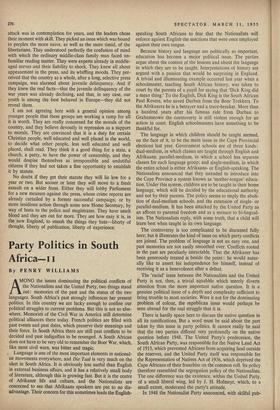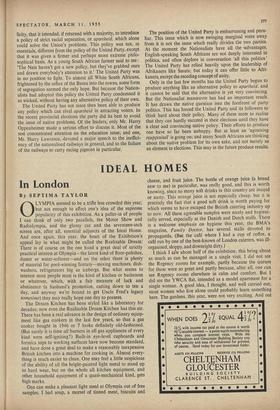Party Politics in South Africa—n
By PENRY WILLIAMS MONO the issues dominating the political conflicts of the Nationalists and the United Party, two things stand out: memories of the past and the status of the two languages. South Africa's past strongly influences her present politics. In this country we are lucky enough to confine our political struggles to current problems. But this is not so else- where. Memorie's of the Civil War in America still determine political alliances there today. French politics are filled with past events and past dates, which preserve their meanings and their force. In South Africa there are still past conflicts to be decided and past indignities to be revenged. A South African does not have to be very old to remember the Boer War, which, like most civil wars, was bitter and tragic.
Language is one of the most important elements in national- ist movements everywhere, and Die Taal is very much on the alert in South Africa. It is obviously less useful than English in external business affairs, and it has a relatively small body of literature, although this is growing fast. But it is the centre of Afrikaner life and culture, and the Nationalists are concerned to see that Afrikaans speakers are put to no dis- advantage. Their concern for this sometimes leads the English- speaking South Africans to fear that the Nationalists will enforce against English the sanctions that were once employed against their own tongue.
Because history and language are politically so important, education has become a major political issue. The parties argue about the content of the lessons and about the language in which they are to be taught. Interpretations of history are argued with a passion that would be surprising in England. A trivial and illuminating example occurred last year when a schoolmaster, teaching South African history, was taken to court by the parents of a pupil for saying that 'Dick King did a mean thing.' To the English, Dick King is the South African Paul Revere, who saved Durban from the Boer Trekkers. To the Afrikaners he is a betrayer and a truce-breaker. More than a hundred years after his famous ride from Durban to Grahamstown the controversy is still violent enough for an action in court. English schoolmasters have something to be thankful for.
The language in which children should be taught seemed, on the face of it, to be the main issue in the Cape Provincial elections last year. Government schools are of three kinds: dual-medium, in which classes are taught through English and Afrikaans; parallel-medium, in which a school has separate classes for each language group; and single-medium, in which the entire school is either Afrikaans- or English-speaking. The Nationalists announced that they intended to introduce into the Cape Province a system known as 'mother-tongue' educa- tion. Under this system, children are to be taught in their home language, which will be decided by the educational authority and not by their parents. The policy seems to imply the aboli- tion of dual-medium schools, and the extension of single- or parallel-medium. It has been attacked by the United Party as an affront to parental freedom and as a menace to bi-lingual- ism. The Nationalists reply, with some truth, that a child will learn best when taught in its own language.
The controversy is too complicated to be discussed fully here; but it illustrates the kind of issue on which party conflicts are joined. The problem of language is not an easy one, and past memories are not easily smoothed over. Conflicts rooted in the past are peculiarly intractable. That the Afrikaner has been generously treated is beside the point:, he would natur- ally like to assert his independence for himself, instead of receiving it as a benevolence after a defeat.
The 'racial' issue between the Nationalists and the United Party is not, then, a trivial squabble which merely diverts attention from the more important native question. It is a genuine political issue of a depth and complexity sufficient to bring trouble to most societies. Were it not for the dominating problem of colour, the republican issue would perhaps be seen abroad for the real struggle that it is.
There is hardly space here to discuss the native question in all its ramifications. But a word must be said about the part taken by this issue in party politics. It cannot really be said that the two parties differed very profoundly on the native question before 1948. The United Party's predecessor, the South African Party, was responsible for the Native Land Act of 1913, which prevented Africans from acquiring land outside the reserves, and the United Party itself was responsible for the Representation of Natives Act of 1936, which deprived the Cape Africans of their franchise on the common roll. Its policy therefore resembled the segregation policy of the Nationalists. The one difference was the existence, within the United Party, of a small liberal wing, led by J. H. Hofmeyr, which, to a small extent, moderated the party's attitude.
In 1948 the Nationalist Party announced, with skilful pub- licity, that it intended, if returned with a majority, to introduce a policy of strict racial separation, or apartheid, which alone could solve the Union's problems. This policy was not, in essentials, different from the policy of the United Party, except that it was given a firmer and perhaps more extreme philo- sophical basis. As a young South African farmer said to me: 'The Nats haven't got a new policy, but they've grabbed ours and drawn everybody's attention to it.' The United Party was in no position to fight. To almost all White South Africans, frightened by the influx of the Bantu into the towns, some form of segregation seemed the only hope. But because the Nation- alists had adopted this policy the United Party condemned it as wicked, without having any alternative policy of their own.
The United Party has not since then been able to produce any policy which can rival apartheid in attracting voters. In the recent provincial elections the party did its best to avoid the issue of native problems. Of the leaders, only Mr. Harry Oppenheimer made a serious effort to discuss it. Most of the rest concentrated attention on the education issue; and one, Mr. Harry Lawrence, devoted a major speech to the ineffici- ency of the nationalised railways in general, and to the failure of the railways to carry racing pigeons in particular. The position of the United Party is embarrassing and pecu- liar. This issue which is now swinging marginal votes away from it is not the issue which really divides the two parties. At the moment the Nationalists have all the -advantages. English-speaking South Africans are not deeply interested in politics, and often deplore in conversation 'all this politics.' The United Party has relied heavily upon the leadership of Afrikaners like Smuts; but today it can offer little to Afri- kaners, except the receding concept of unity.
Only in the last few months has the United Party begun to produce anything like an alternative policy to apartheid, and it cannot be said that the alternative is yet very convincing. But the Nationalist manceuvre has had an important result. It has drawn the native question into the forefront of party politics. This has forced the United Party and its followers to think hard about their policy. Many of them seem to realise that they can hardly succeed in their elections until they have a clear and convincing native policy. Their efforts to produce one have so far been unhappy. But at least an 'agonising reappraisal' is going on; and many South Africans are thinking about the native problem for its own sake, and not merely as an element in elections. This may in the future produce results.











































 Previous page
Previous page